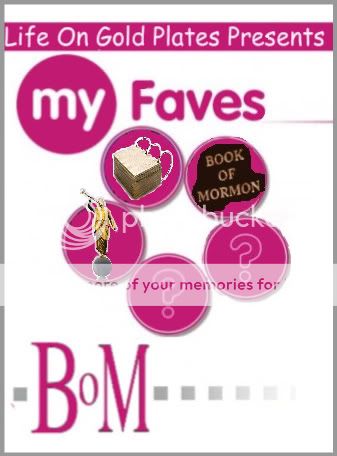New Series: "My Faves" on the Book of Mormon
 From the day the Book of Mormon rolled off Grandin's press in 1830 until today, it's place in the awareness of Church members has shifted and increased for good and ill. Critics of the book have pointed to anachronisms and believers have sought for vindicating evidence of its authenticity.
From the day the Book of Mormon rolled off Grandin's press in 1830 until today, it's place in the awareness of Church members has shifted and increased for good and ill. Critics of the book have pointed to anachronisms and believers have sought for vindicating evidence of its authenticity.
Some have predicted that the book would fade into obscurity based on its archaic language and message. In 1972 a religious history professor at Yale observed: “A few isolated individuals can still read [the Book of Mormon] as a religious testimony,…but not even loyal Mormons can be nourished by it as they were a century ago." Terryl L. Givens argues that the professor's statement was “simply dead wrong." Scholarly research regarding the Book of Mormon from different angles has become more sophisticated. Devotional appreciation increases as Mormons spend more time in its pages. “Like Muslims, Jews, and other Christians," Givens explains, "the Mormons are increasingly coming to be People of the Book—their book."1
In 1997, two Evangelical scholars acknowledged the increasing sophistication in LDS scholarship regarding the Book of Mormon in their tellingly-titled paper "Mormon Apologetic, Scholarship and Evangelical Neglect: Losing the Battle and Not Knowing It?"2 There are, "contrary to popular evangelical perceptions, legitimate Mormon scholars" they write. "We use the term scholar in its formal sense of 'intellectual, erudite; skilled in intellectual investigation; trained in ancient languages.'" A similar paper might be delivered to some members of the Church titled "Mormon Scholarship and Mormon Neglect: Winning the Battle and Not Knowing It?" In other words, many members aren't aware of (or perhaps interested in) the great research available on the Book of Mormon. When Elder Jeffrey R. Holland mentioned Solomon Spaulding and Ethan Smith in his recent conference address on the Book of Mormon, many members were left scratching their heads.
But why focus on the "battle" aspect? I believe that apologetics, that is, direct defenses, have an important place. But beyond vindicating historicity or accounting for problematic passages, Mormon scholarship on the Book of Mormon serves to help readers better understand the Book of Mormon in general. It need not be a battle, it can simply be an exciting and spiritual adventure to learn more about the Book of Mormon. Great articles have been published in Dialogue, the Journal of Book of Mormon Studies, the FARMS Review, BYU Studies, and elsewhere. The sheer volume can be overwhelming. Where to start?
I've been asking Mormon scholars to list and briefly describe their favorite five articles on the Book of Mormon. By highlighting a few good articles (rather than full-length books) I hope to light a fire in those who haven't kept abreast with Book of Mormon scholarship. People who think B.H. Roberts's old study or Hugh
Nibley's important works are the end of the story have a lot of catching up
to do. Why not start by checking out Fave 5's from scholars like Grant Hardy, Kevin Christensen, Brant Gardner, and others?
The new series "My Faves" (on the Book of Mormon) begins next week.
See Grant Hardy's faves here
See Kevin Christensen's faves here
See Brant Gardner's faves here
See Richard Bushman's faves here
Terryl L. Givens, The Book of Mormon: A Very Short Introduction, (Oxford University Press, 2009), 110-111.Givens provides a wonderful overview of scholarly research and debate about the Book of Mormon in By the Hand of Mormon: The American Scripture that Launched a New World Religion (Oxford University Press, 2003).
[2]
Carl Mosser and Paul Owen, delivered at 1997 Evangelical Theological Society, Far West Annual Meeting, 25 April 1997. Published in Trinity Journal, n.s., 19/2 (1998).



 32
Comments
32
Comments